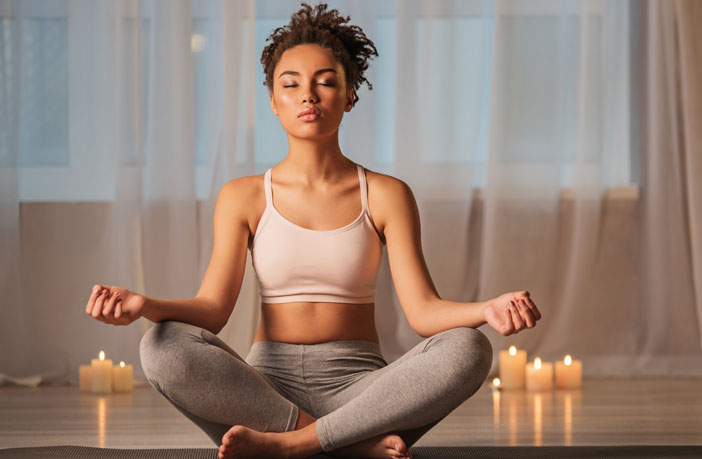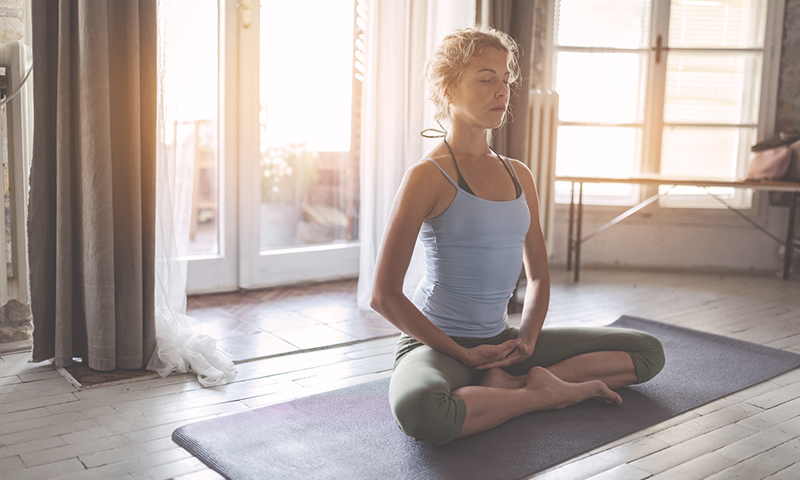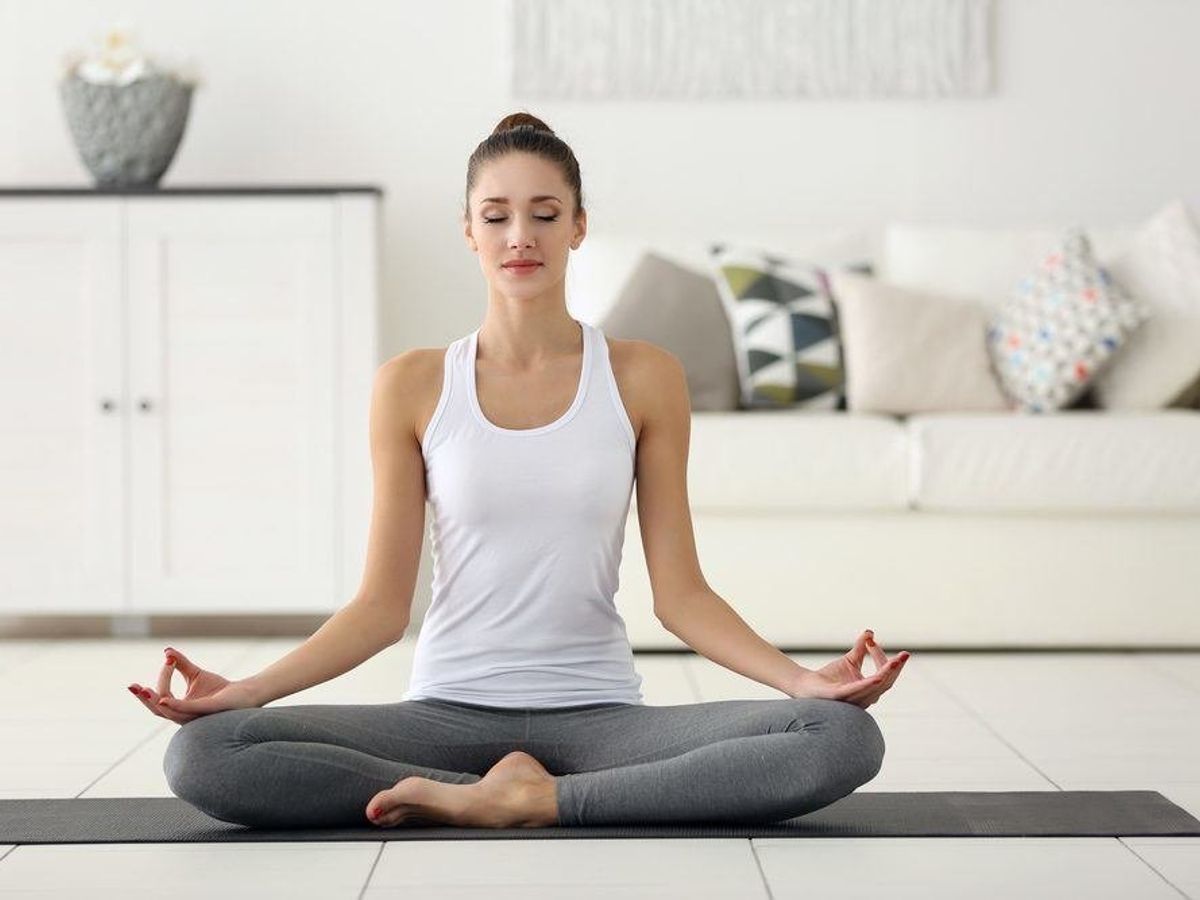Meditation is a concept that is no longer strange today, but in reality, not everyone understands the true nature of meditation. So what is meditation ? What are the health benefits of sitting meditation? Let’s find out with us through this article!
What is meditation?
Until now, when it comes to meditation, many people often think of a Buddhist practice. However, the reality is that meditation existed even before Shakyamuni Buddha was born. Zen has its roots in ancient Indian philosophy, it appears not only in Buddhism but also in many other religions such as Christianity, Taoism, Jainism…

There are many different definitions of meditation, for example, in Buddhism, meditation refers to practices that train the mind. In yoga, meditation is a state of extreme purity and concentration where the mind flows unimpeded, completely immersed in the thought of universal consciousness. That is why in yoga , meditation is also known as Dhyana which means “flow of mind”.
Or, according to the Cambridge dictionary, meditation is directing one’s attention to a single thing and is used as a religious act or a means to help regain calm and relax the body. Another definition says that meditation is any act of keeping one’s attention comfortably in the present moment. When the mind is calm and attentive to the present moment, we no longer have reactions to past or future events, but past and future events are the two main causes of stress. Stress affects our health.

In general, although it is expressed very differently, in essence, the definitions of meditation all show that this is a method of training people’s ability to concentrate, thereby helping people become calm and calm. feel deep peace.
Meditation is also divided into many different types such as meditation, meditation… In which, meditation (samadhi) is the most common method, usually done by focusing on the breath or a specific object. in some way to calm the mind, develop concentration and stillness. Usually, when we talk about meditation in general, we are talking about meditation.
What are the benefits of sitting meditation?
Life is full of worries, causing people to often fall into a state of stress, stress, and distraction… Therefore, it is not difficult to understand that nowadays, many people have been looking to meditation as a solution. relieve stress and improve your health. So what are the benefits of sitting meditation?

The effects that meditation brings to people are very diverse, some of the outstanding effects that we can mention are:
- Relieve stress, reduce stress: Many studies by world-famous universities have shown that regular meditation has the ability to reduce gray matter density in brain regions associated with anxiety and stress. Therefore, practicing meditation will help improve many emotional problems, relieve stress, reduce stress, improve anxiety disorders and help prevent and support depression treatment. People who practice meditation regularly tend to love life, think positively, and be more peaceful than those who don’t practice. See more: Meditation music calms the mind, relaxes, strengthens mind and body .
- Reduce drowsiness, enhance concentration, improve memory: Some American studies have shown that regular meditation has the effect of reducing sleepiness while maintaining high concentration. This may be because the practice of meditation will help sleep better. Not only that, meditation also helps to enhance memory because it controls stress and stress – the leading factor causing distraction and memory decline. Reference: Relaxing, relaxing yoga meditation music, easy sleeping yoga meditation music .
- Strengthening immunity, preventing some cardiovascular diseases: During meditation, your body will need less oxygen, so the heart will beat less, which means blood pressure will decrease. Meditation also significantly reduces the risk of death from stroke and heart attack in people with heart disease, increases antibodies and helps the immune system respond faster and stronger.
- Pain relief: Many studies have shown that meditation is more effective at reducing headaches than morphine, an hour of meditation can reduce pain intensity by 40% and reduce pain discomfort by 57%.
- Improves Hyperactivity : In several studies with adult patients with attention deficit hyperactivity disorder, it was found that meditation helped this group to reduce hyperactivity, impulsivity and improve hyperactivity. acquire the skill of “acting consciously”.
- Slow down the aging process: The aging process is fast or slow depending on the rate at which you consume oxygen. Meanwhile, the process of meditating causes your body to adjust its breathing, taking in less oxygen. Therefore, people who regularly meditate will look much younger than their real age.

It can be said that meditation brings many positive effects to people, both physically and psychologically. Therefore, nowadays, many people have started to practice meditation at home to improve health, beauty as well as purify the spirit and mind. So what should you pay attention to when meditating at home?
Things to note when practicing meditation at home
The most important thing when meditating at home is that you need to keep the correct posture, the back must be straight. If you are meditating in a chair, it is best not to lean on the chair and to sit properly. This helps you maintain alertness and allows you to focus on your meditation more easily.

During meditation, you can close or open your eyes because the ultimate goal of meditation is to train your ability to concentrate, no matter what. If you find yourself focusing on your breath better with your eyes closed, it’s best to close your eyes. And if you feel tired and doze off every time you close your eyes, try to open your eyes slightly and gently focus on the space on the floor in front of you.
Meditating for 10 minutes a day is many times better than sitting for 60 minutes in a single day of the week, so no matter how busy you are, try to find time to spend a few minutes in meditation every day! In addition, you should start meditating for a short period of about 5 minutes to get used to it, then gradually increase the time when you feel comfortable with this method. If you just got used to it and you tried to meditate for 30 minutes from the beginning, you will probably find it quite frustrating and discouraging.
You should choose quiet spaces to practice because if there are few distractions around, you will focus better and make the meditation process much more effective. In addition, the best time for you to practice meditation is usually early in the morning because this is the time when the body has just relaxed after sleeping, you will have less thoughts to distract yourself.

When meditating, you should avoid wearing tight clothing. Choose the clothes you usually wear to exercise or sleep, breathable, airy clothes are considered the smartest choice.
Meditation is always difficult for beginners, to achieve high efficiency requires a long practice process and the practitioner must have a stable spirit. In addition, to save time and effort, you can find a teacher to guide you on how to meditate most effectively. For those who have psychological diseases such as depression, anxiety disorder, bipolar disorder, paranoia, or often have negative thoughts, it is absolutely forbidden to self-study meditation at home.
Above is some information that we want to share so that you can understand what meditation is as well as the effects that meditation brings to people. If you find this article useful, please share it with those around you and don’t forget to visit us to find out more interesting information! See you in the next posts.











